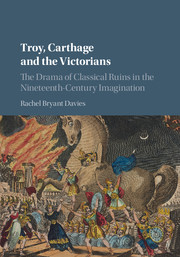 Troy, Carthage and the Victorians
Troy, Carthage and the Victorians Book contents
- Frontmatter
- Contents
- List of Plates
- List of Figures
- Acknowledgements
- Prologue
- 1 Introduction: The Ruins of Troy and Carthage ‘Still Flaming to the Imagination’ in the Nineteenth Century
- 2 ‘An Imaginary Troy’: Homeric Pilgrimage, Topography and Archaeology
- 3 ‘Not Classic, but Quite Correct’: The Trojan War at the Circus
- 4 Freely Perverted from Classic Texts’: The Iliad and Aeneid Burlesqued
- 5 ‘Sitting Among the Bricks of Covent Garden’: Carthage and the Future Ruins of the Nineteenth Century
- Epilogue: Troy and Carthage as ‘A Beacon and a Warning’
- Appendix A List of Burlesques
- Appendix B Select Chronology
- References
- Index
1 - Introduction: The Ruins of Troy and Carthage ‘Still Flaming to the Imagination’ in the Nineteenth Century
Published online by Cambridge University Press: 03 March 2018
- Frontmatter
- Contents
- List of Plates
- List of Figures
- Acknowledgements
- Prologue
- 1 Introduction: The Ruins of Troy and Carthage ‘Still Flaming to the Imagination’ in the Nineteenth Century
- 2 ‘An Imaginary Troy’: Homeric Pilgrimage, Topography and Archaeology
- 3 ‘Not Classic, but Quite Correct’: The Trojan War at the Circus
- 4 Freely Perverted from Classic Texts’: The Iliad and Aeneid Burlesqued
- 5 ‘Sitting Among the Bricks of Covent Garden’: Carthage and the Future Ruins of the Nineteenth Century
- Epilogue: Troy and Carthage as ‘A Beacon and a Warning’
- Appendix A List of Burlesques
- Appendix B Select Chronology
- References
- Index
Summary
Amidst the startling survivals of antiquity, the dusty revivals of the mythic man, not one has come with such a theatrical (would that we could say dramatic!) éclat upon us as the recent excavations in the Troad […] it was a sensation not unlike that from suddenly seeing a megatherium in the paddock beyond your garden wall, to hear the announcement of the discovery of King Priam's treasure.
William Stillman, Cornhill Magazine, June 1874Throughout the summer of 1873, news had reached Britain of discoveries which, it was claimed, proved the existence of Homer's Troy. Reviewing this exciting period the following summer,William Stillman, an American journalist residing in London, echoed Charles Dickens's comic description from two decades earlier in Bleak House, of ‘aMegalosaurus, forty feet long or so, waddling like an elephantine lizard up Holburn Hill’. In likening the announcements from the German archaeologist Heinrich Schliemann to ‘suddenly seeing a megatherium in the paddock beyond your garden wall’, Stillman ranks the discovery of Troy's ruins as the pinnacle of those contemporary developments which seemed to be defining modern experience. The discovery of fossils belonging to dinosaurs and other prehistoric creatures had recently opened a window onto a hitherto unknown past; now this new archaeological evidence for the existence of Troy and its location at Hisarlik in modern-day Turkey shifted, and even dissolved, accepted boundaries between legend and history, mythology and reality. Both sorts of unearthed evidence changed notions of time and history: even as the ruins of ancient cities and antediluvian monsters popularised the new concept of prehistory, they raised troubling questions about the future of modernity.
King Priam's treasure, seemingly unearthed from the palaces of Troy, was, as Stillman's comment underscores, a particularly sensational discovery. The Iliad and Aeneid were ‘still flaming to the imagination’: Homer's and Virgil's epics were two of the most formative works of the literary canon and acknowledged backbones of the classical tradition.4 However, such extremes of enthusiasm and scepticism were not solely on account of Troy's central role in narratives of the Trojan War and its aftermath.
- Type
- Chapter
- Information
- Troy, Carthage and the VictoriansThe Drama of Classical Ruins in the Nineteenth-Century Imagination, pp. 5 - 46Publisher: Cambridge University PressPrint publication year: 2018


